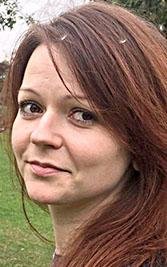LONDON -- Yulia Skripal has been released from a hospital in southern England, officials said Tuesday, five weeks after she and her father, a former Russian spy, were poisoned with a nerve agent that left them fighting for their lives and raised tensions between Russia and the West.
The poisoning of Skripal and her father, Sergei Skripal, has had ramifications far beyond the cathedral city of Salisbury, England, where it took place, prompting a confrontation between Russia and the West that escalated.
Britain has blamed Moscow for the poisonings, an accusation that the Kremlin has continually mocked and rejected, and the dispute precipitated a series of expulsions of diplomats between the two countries and beyond, as Britain's allies rallied to its side.
Britain says the March 4 poisoning involved a rare class of the military-grade nerve agent Novichok, which is widely believed to have been developed in Soviet laboratories, leaving the Skripals in critical condition.
Yulia Skripal emerged from critical condition almost two weeks ago, and her father's condition was raised to stable from critical Friday.
"Yulia has asked for privacy from the media, and I want to reiterate that request," Dr. Christine Blanshard, medical director of Salisbury District Hospital, told reporters Tuesday. "This is not the end of her treatment, but marks a significant milestone."
Though Sergei Skripal, 66, "is recovering more slowly than Yulia," Blanshard said, "we hope that he, too, will be able to leave hospital in due course."
She did not comment on reports in the British news media that Yulia Skripal, 33, had been released Monday. It was not immediately clear where the Skripals might go; investigators have sealed off Sergei Skripal's house in Salisbury, and investigators say the nerve agent was most likely applied to its front door.
One other person is known to have been sickened by the toxin -- Detective Sgt. Nick Bailey, who went to the house at the start of the investigation. He was released from the hospital March 22.
Yulia Skripal, who lives in Russia, was visiting her father when they were poisoned, and it is not clear whether she will return to Russia.
Russian officials say they have been improperly denied access to her, but the British police said last week that Yulia Skripal was aware of the Russian offer to visit and help, and that she had turned it down.
On Tuesday, the Russian Embassy in London wrote on Twitter: "We congratulate Yulia Skripal on her recovery. Yet we need urgent proof that what is being done to her is done on her own free will."
The Sunday Times of London, citing anonymous sources, has reported that senior intelligence officials in Britain were talking to their counterparts at the CIA about sending the Skripals to the United States. The two Russians would be provided with new identities, part of a broader effort to keep them safe in case there should be another attempt on their lives.
The Russian Embassy seemed to acknowledge that possibility with another post on Twitter later Tuesday, again demanding proof that Yulia Skripal was acting of her own accord.
"Secret resettlement of Mr and Ms Skripal, barred from any contact with their family will be seen as an abduction or at least as their forced isolation," the post read.
The case has mixed high-stakes international diplomacy with elements of farce. Hundreds of diplomats around the world have been expelled, Britain has moved to crack down on the financial dealings of Russians in the country, and Russian President Vladimir Putin's government has offered a variety of alternative explanations for what happened and complained that the Skripals' pets -- two guinea pigs and a cat -- were killed by the British and then cremated to destroy evidence.
The investigation took another twist last week when Viktoria Skripal, a 45-year-old Russian accountant and relative of the two Russians, questioned the accounts of the British authorities and said she was "scared" for the pair.
She made her comments in an interview conducted after she recorded what she said was a phone call with Yulia Skripal. She had given the recording to Russian state television, which broadcast it.
The Organization for the Prohibition of Chemical Weapons, an international body, is examining evidence in the case and is expected to announce the results of its tests this week. The findings of its investigation are expected to be limited, however, to identifying the poison but not its source.
Weeks ago, British government officials speculated that the Skripals might never fully recover.
A Section on 04/11/2018

